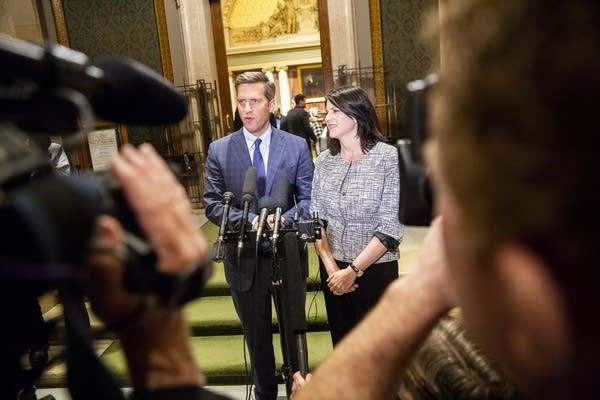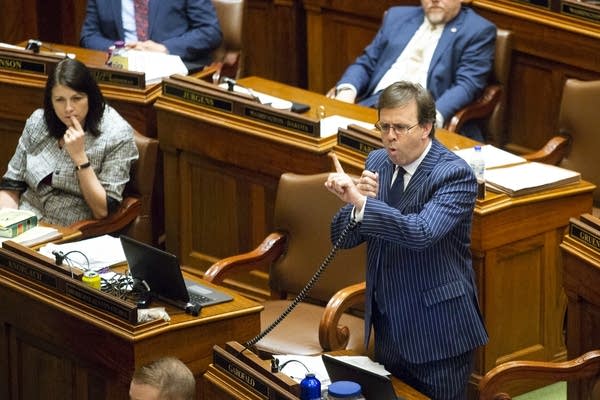'Debacle' or 'work done'? Session's story yet to be written

Go Deeper.
Create an account or log in to save stories.
Like this?
Thanks for liking this story! We have added it to a list of your favorite stories.
Now, Minnesota lawmakers cross their fingers.
The Legislature ended a three-month session Sunday with a flurry of action, sending Gov. Mark Dayton a stack of bills that check off all of their pre-session priorities. But Dayton vowed to take down some of their marquee items — a tax-cut package and a wide-reaching spending bill among them.
"It's been a debacle, but it's a debacle of their creation," Dayton said at a news conference a few hours before the final gavel fell.
Dayton railed against Republican majorities that tried to jam him at every turn, combining initiatives boasting wide appeal with items they knew he'd balk at.
Turn Up Your Support
MPR News helps you turn down the noise and build shared understanding. Turn up your support for this public resource and keep trusted journalism accessible to all.
"They would have taken the opportunity for us to work collaboratively and cooperatively together, we could have gotten these things done and put together," Dayton said. "And Minnesotans would have been the beneficiaries of that. But that's not the way they're operating. That's not their objective."
Republicans said it was Dayton who didn't come beyond halfway. They held out hope that the governor would back off his veto threat.
"He might, but that's something we can't control," said Senate Majority Leader Paul Gazelka, R-Nisswa, adding that the GOP would use the 14 days Dayton has to consider the bills to focus on people who would miss out if they go down.

"We hope to bring people in here yet in the next few days who will be impacted by the bill either by signing it or not signing it," Gazelka said. "I'm sure they're going to be talking to the governor, too."
The bills passed on the session's final days include:
• a measure to cut taxes and free up more classroom money for schools
• a construction package that could lead to $1.5 billion in projects
• a massive budget bill that would increase state contributions to broadband expansions, provide schools money to secure campuses, take steps to attack the opioid epidemic and more.
All are shared goals of the governor and the Legislature, but most of the bills come with provisions that Dayton sees as objectionable or fail to adequately address the problems facing the state. The main spending bill spans 990 pages and would parcel out more than $130 million of a projected budget surplus.
The tax bill authorizes $225 million in spending for schools meant to avert layoffs and program cuts in some districts, but Dayton called it "fake," because only $50 million of it was new money, and the rest comes from existing allocations schools are allowed to use in new ways.
Republicans were openly pleading with Dayton to let their work stand.
"Let's all swallow our pride over what we really wanted and thumped our chests over and had to have and realize we've all come a long ways toward meeting in the middle," said Rep. Jenifer Loon, R-Eden Prairie, during debate over the combined education funding and tax-cut bill. "Let's get this done."

House Speaker Kurt Daudt, R-Zimmerman, said he was proud of the work accomplished this session. He also took at jab at Dayton.
"You know what? We got our work done," Daudt said. "Unfortunately, it's not always easy to engage this governor, and in the number of years that I've worked with him now, every year it gets a little more difficult to get him engaged early enough in the process to make a meaningful difference."
Daudt and other Republicans were angered by the governor's veto of legislation to provide $9 million to deputy registrars, who were hurt financially by problems with the state's new licensing system. But their attempt to override the veto fell short.
But many Democrats said Republicans were at fault. They said the GOP purposely packed the bills full of things they knew Dayton wouldn't stomach and items he saw as critical, setting him up for disappointment either way.
"This Republican legislative majority has shown that they're very good at ignoring the governor, they're very good at fighting with the governor," said House Minority Leader Melissa Hortman, DFL-Brooklyn Park. "What they haven't shown any aptitude at all is listening to the governor or compromising with the governor."
Sen. Susan Kent, DFL-Woodbury, said the bills are skewed and could put the state's fiscal stability at risk. The tax plan is an example, she said.
"This was a shell game. There was not new money in there for our schools. It was not going to solve our problem or anybody else's," Kent said, adding that schools around Minnesota "are going to have a hard time getting inflationary increases after the deficit starts going up."
Democrats contend the state won't be able to afford corporate tax rate cuts, other business breaks and some individual tax cuts if the economy starts to stumble. Republicans were adamant that the economy would be invigorated, not harmed.
Two bills passed in the final hour that do stand a decent chance of gaining Dayton's signature.

One would give the green light to $1.5 billion in public works projects. About $825 million of that would come through general obligation bonds, which pledge the state's full faith and credit. The rest are backed by other accounts.
The projects range from $2 million for a new 50-meter swimming pool in New Hope to $15 million for a new visitor center at Fort Snelling to a long list of repairs on college campuses. The bill was in doubt until the very end, but passed with votes to spare.
The other bill likely to get signed is a pension fix. It affects tens of thousands of retirees from public-sector jobs. It would chop a big unfunded liability by requiring employers and employees to kick in more and pare back the expected returns. Early retirement and pension cash-outs would be less attractive.
Some bills that got considerable public attention failed to cross the finish line.
Lawmakers didn't adopt a hands-free requirement for drivers on their cellphones. A stiffer fine structure made it into the budget bill that is at risk of being vetoed.
There were no floor votes on gun restrictions in the wake of two high-profile shootings at schools in southern states.
Sen. Ron Latz, DFL-St. Louis Park, criticized his colleagues for inaction.
"Our committees this year spent more time in hearings to designate Dan Patch as the official state horse as we did in actually considering my bills to reduce gun violence," Latz said with an hour to go in session. "I hope we can set our priorities a little higher next year."
Republicans pointed to money for additional school safety tucked into two bills — the spending bill and the bonding bill.
"We at least get some money toward safe schools," Gazelka said.
MPR News reporter Tim Pugmire contributed to this report.


